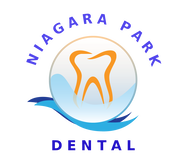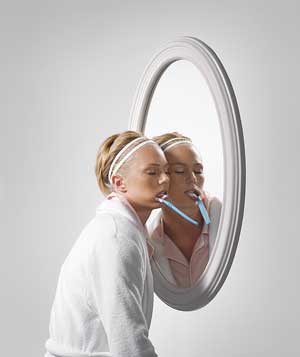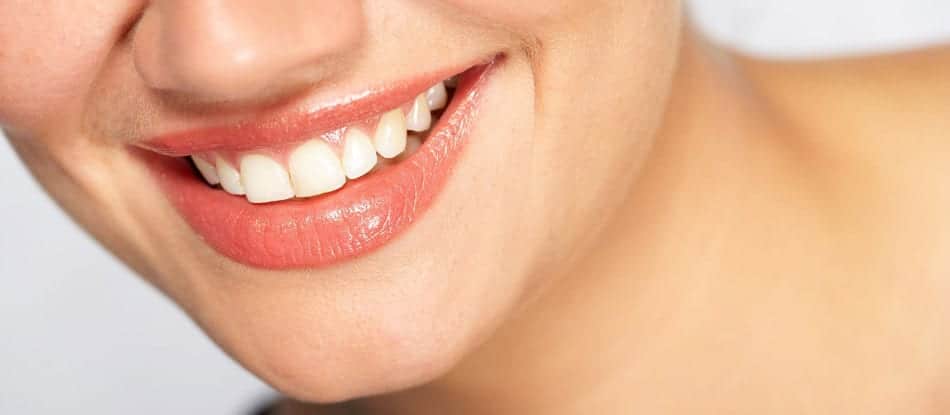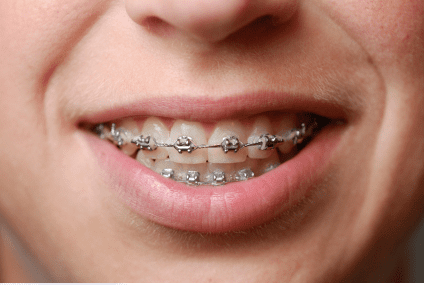|
Baby teeth, why? And when? The development of primary teeth starts before birth, in the second trimester of pregnancy. Sometimes a newborn can have a tooth as early as birth. The time frame for tooth eruption is an average, there will always be some discrepancy. This fact underscores the importance of regular check ups and x-rays to make sure teeth are erupting in a favourable order. Time schedule for baby teeth:
The full set of primary teeth should be in place by the age of 2.5 years to 7 years old. Development of primary teeth affects the development of adult teeth underneath. A missing baby tooth most probably will end up with a missing adult tooth. – every 6 months, 4 teeth will erupt. – girls usually get their teeth before boys. – Lower teeth usually precede upper ones. – teeth erupt in pairs, left and right. – Primary teeth are smaller than the adult ones. So why do we have primary teeth since we will lose them?The bone-tooth relation is an active one. Teeth are not just setting there and to give us something to chew with. Teeth induce the bone growth and direct it in the right direction. When someone loses a tooth, bone resorbs, so imagine if there were no teeth at all. And their importance is as follows: – preserve space for adult teeth – help form the skeletal features of the face. – help develop speech in the child, with proper phonetics. – healthy teeth, means baby can chew better, getting better nutrition. Adult teeth eruption: Upper teeth Central incisors: 6 – 8 years old Lateral Incisors: 8 – 10 years old Canines 11 – 13 years old First premolars 10 – 11 years old Second premolars 10 – 12 years old Firs molar 6 – 7 years old Second molar 12 – 13 years old Third molar (wisdom tooth) 17 – 21 years old Adult teeth eruption Lower teeth Central incisors: 6 – 7 years old Lateral Incisors: 7 – 8 years old Canines 9 – 10 years old First premolars 10 – 12 years old Second premolars 11 – 12 years old Firs molar 6 – 7 years old Second molar 11 – 13 years old Third molar (wisdom tooth) 17 – 21 years old Something needs paying attention to, it the time of eruption of the first adult molar, which is around the age of 6. This molar has no baby tooth predecessor, and just erupts. This makes it parents think it is just another baby tooth, and if gets decayed, they say, why not just take it out. ConclusionEruption schedule can vary. You must appreciate the role of baby teeth. Make sure you consult us regarding the development of your children dentition to make sure everything is ok. Developmental abnormalities can be diagnosed early and treated early.
0 Comments
It is always recommended that you brush your teeth at bed time. but why is that important? what are the benefits? 1- Remove the dental plaque build up. During the day as we consume food. bacteria use whatever it can get hold of to stick to our teeth forming a layer known as dental plaque, and that is the very beginning of tooth decay. when you brush last thing in the day, you are removing the dental plaque that formed during the day. also whatever you place in your mouth (sometime might not be food, like a pen) will introduce germs into your mouth. This can be a whole new species not present in your mouth, so brush it off before it colonizes your mouth. 2- Dental plaque does form over tooth surface even without eating or drinking. However if you brush your teeth, you make your teeth surface smoother, less acceptable to dental plaque build up. 3- reduce the amount of bacteria in your mouth. it is impossible to eliminate the bacteria from your mouth, and it is called normal flora. but by brushing, you are keeping their numbers in check. If their numbers increase that can be the trigger for tooth decay or gum problems. 4- Awaken to a fresh mouth. This all makes sense but it doesn’t quite show the significance of bed time brushing. so why is it important at that time! The answer in one word: saliva. Saliva is an important defence mechanism. It washes our teeth, removing bacteria, even killing some, as it contains antibodies. Saliva also lowers the acidity, protecting teeth from wear, it also makes teeth less acceptable to dental plaque formation. When we sleep, we lose that defence mechanism, as the amount of saliva we produce while sleeping is almost zero compared to what we produce while awake. so if we lose our defence, we need to make sure we reduce the attack before going to bed. Conclusion:Brushing and flossing at bed time is important because we don’t have as much saliva while sleeping.
What are veneers: These are just a thin layer of porcelain that gets glued to the front teeth. They are used mostly for cosmetic reasons, when tooth whitening is not enough, or when there are obvious cracks on the teeth, or when they are needed to close a gap between teeth. Criteria: – They are Translucent, which is important to give a natural appearance, this allows them to transmit light through and reflect off the teeth giving them natural look. – Smooth surface, this obviously mean better looks and less catching to dental plaque, which means less staining – They are fabricated in one colour and to match the remainder of dentition – if needed – hence you will have one harmonious colour showing through giving you a better smile. What effect can they have: 1- Change size of teeth, if you have large teeth, veneers can make them smaller, and vice versa. 2- Alter shape of teeth, sometimes the shape of teeth is not desirable. Veneers can fix that to some extent. 3- Change the colour. You might have yellowish teeth, veneers can fix that 4- Fix chipped teeth. 5- Close gaps between teeth. 6- Realign teeth. They can fix minor crockedness in front teeth 7- Lip enhancement. They might affect the appearance of the lips 8- Might be the solution to sensitive front teeth. Where to place them: Usually they are used to fix the top front six teeth. Less common than that is for the lower front teeth. Sometimes we might use them a bit further than the canine teeth. How are they made: Veneers are usually finished in two sessions: 1- Teeth are trimmed slightly. And an impression is taken 2- The impression is sent to the lab, where the veneers are constructed. 3- When the veneers arrive back from the lab, they are cemented in. done. However nowadays we have the prefabricated veneers which are made of a different material, and those can be finished by one visit. Conclusion:Veneers are one of the options of cosmetic dentistry. However once committed, they is no returning back, especially if tooth trimming is required, so make sure you talk to us and understand the benefits and limitations of the procedure. If you are a good candidate for veneers, chances are you will be smiling more, you have been warned!
The importance of healthy teeth and gums is very well known and appreciated but here are some facts that many people miss: 1. Sour Isn’t Good For Your TeethPeople appreciate that what is sweet is bad for you. But you need to know that what is sour is bad as well. Sour and acidic food can put your mouth in an acidic condition that result in tooth wear. Teeth might erode by themselves or due to a mechanical wear that follows. So after you have a fizzy drink, don’t brush your teeth immediately, but try to neutralize the acid, with water, or Xylitol gum. If you love candy, switch to xylitol-containing gum, which will help restore natural mineral balance in your teeth as well as prevent tooth decay. 2. You can be missing some teethWe are not talking about losing teeth to decay, but the congenitally missing teeth. Some people never develop wisdom teeth, less common are the upper lateral incisors (the tooth next to the big front tooth), and lower second premolars (second one behind the canine). 3. Your Braces Could Be The Reason For Your CavitiesBraces make it hard to clean your teeth properly. They invite food retention between your teeth, causing inflammation in the gums and tooth decay. If you wear braces, you need to be extra careful when you brush and rinse your teeth. Flossing is probably impossible with braces. You can substitute floss with picksters. Remember, we get braces to have nice teeth, so keep motivating yourself or your children if they have braces. 4. Enamel Is Tough, but can break and chipEnamel is the hardest tissue in our body. But it is designed and made for eating, not opening bottles. Enamel can break, and will break if exposed to high strength trauma. The common causes for chipping Enamel are tongue piercing, chewing on ice, popcorn. An american study showed that 41% of people with oral piercing suffered from tooth fracture and wear. 5. Too much Fluoride is not goodFluoride strengthen teeth and it is placed in drinking water and salt. However don’t try to get too carried away. Too much fluroide can make your teeth brittle. If consumed i large quantities during teeth development, it causes Fluorosis. A condition that causes discoloration and may be even tooth loss. It important to stick to the guidelines and if you know your council water has fluroide in it, then don’t try to take more in other means. In fact, it’s better to use a fluoride-free toothpaste for kids until they can understand that they need to spit it out and not swallow it. Conclusion:Use teeth for eating only. look after your teeth when you have braces. Don’t take your teeth for granted.
|
AuthorArticles are written by Dr M Hajarat. Archives
July 2024
|
|
Niagara Park Dental
3 / 16 Washington Avenue Niagara Park, NSW 2250 Email: [email protected] Phone: (02) 4329 3003 |
HOURS
Mon 9:00 - 5:30 Tue 9:00 - 5:30 Wed 9:00 - 5:30 Thu 9:00 - 5:30 Fri 9:00 - 5:30 |
|









